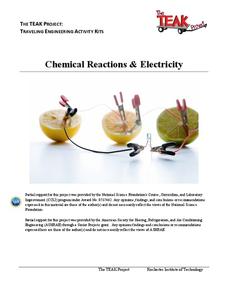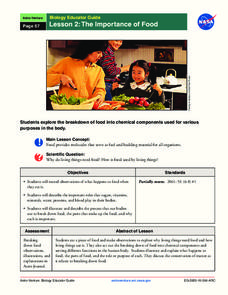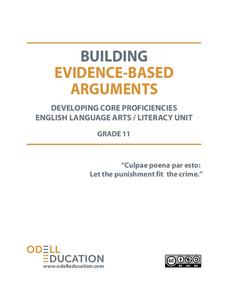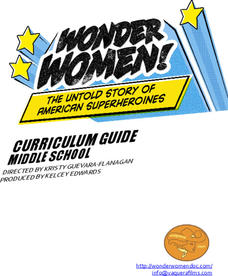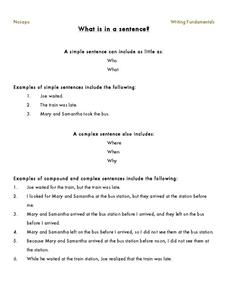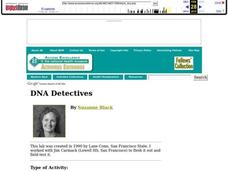Rochester Institute of Technology
Chemical Reactions and Electricity
After a discussion of chemical reactions and electricity, scholars break into groups and follow a scripted activity to discover if fruit can power a clock. After a concluding discussion, the class a presented with a challenge.
NASA
The Importance of Food
Pupils make observations while eating food. They act out the process of food breaking down in the body and the roles of various chemical components, such as sugar and protein. It concludes with an activity illustrating the process and a...
Virginia Department of Education
Prokaryotes
Lead your biology class on a cell-sized adventure! Emerging scientists construct models of prokaryotes, then design an experiment to properly grow a bacterial culture. They conclude the activity by viewing the culture under a microscope....
Virginia Department of Education
The Particle Theory of Matter
Demonstrate the particle theory of matter to high school scientists with an engaging experiment that allows them to visually see the results as substances change from one state to another. The class concludes with a discussion about how...
Facing History and Ourselves
How Journalists Minimize Bias
Class members are challenged to write a neutral news story about the events they observe in a short video. After sharing their stories in groups and discussing the different perceptions, the class concludes with a video of journalists...
PHET
Forces and Motion
The average American will move 12 times, which results in a lot of moving furniture! Class members consider the forces required to move objects with a creative simulation that opens with the forces required to push a filing cabinet....
Advocates for Human Rights
Nativism and Myths about Immigrants
Where do anti-immigrants myths come from, and how can they be refuted? Learners critically analyze media reports and how to identify reliable sources. After studying a timeline that details the history of US nativism, groups research the...
Media Education Lab
The Ethics of Propaganda
What are the short and long-term consequences for consumers and producers of modern media propaganda? Class members ponder this essential question as their unit study of ethics of propaganda concludes. After examining two case studies,...
Odell Education
Building Evidence-Based Arguments: "Cuplae poena par esto: Let the punishment fit the crime."
Should a criminal's punishment match the crime? An argumentative writing plan explores this question as class members investigate a variety of mixed-medium sources by experts in the field, form evidence-based claims, and support them...
Vaquera Films
Wonder Women - The Untold Story of American Superheroines: Middle School Curriculum Guide
Women in power are the focus of a three-module unit that employs comic books to bring home the importance of equality and proficient media literacy skills. In module one, scholars examine gender roles in media—boosting media literacy and...
Core Knowledge Foundation
Third Grade Skills Unit 11: Introduction to Ecology
The concluding skills unit offers learning opportunities and reviews in preparation for assessments. Scholars participate in lessons that examine spelling patterns, prefixes, suffixes, pronouns, and adjectives, draft a letter, and listen...
Core Knowledge Foundation
Unit 7: Poetry
Over the course of a 12-lesson language arts unit, young scholars analyze a variety of poems taking a close look at figurative language and tone. They learn to compare and contrast, improve comprehension, and identify settings. To...
EngageNY
Drafting Introduction and Conclusion
In conclusion ... Scholars analyze the model essay Adversity Faced by Townspeople in
the Middle Ages to gain a better understanding of introductory and concluding paragraphs. After studying the author's strategies, learners begin writing...
Ohio Literacy Resource Center
Writing a Well-Structured Paragraph
Practice with paragraphs while thinking about careers! Learners examine and discuss two sample paragraphs, marking the different elements (topic sentences, body, concluding sentences), and try out writing their own paragraphs. Focusing...
Curated OER
Wrap it up!
Sometimes the conclusion of an essay can be the most important part. Whether your writers are ending with a proposition, lesson learned, or persuasive argument, teach them how to "end with a bang" with this helpful PowerPoint! This...
Curated OER
Radio Program
Students identify and assess the impact of unions on workers, management, and community. They listen to radio stories, students are asked what can they conclude about the impact of unions on the lives of the workers, management, and...
Curated OER
Two Views of the Slave Ship Brookes
Actual ship diagrams and a table of voyage data gives young historians an authentic glimpse of on-board experiences during the Atlantic Slave Trade. The class examines a projected diagram of the slave ship Brooks, recording thoughts....
Nosapo
What Is in a Sentence, Paragraph, and Story?
Language arts is made up of many parts. Learners review the parts of a sentence, as well as how to make a simple sentence into a complex sentence, before examining full paragraphs and identifying the topic, body, and concluding sentence...
NASA
A Different Perspective
What can we learn from the data? Young scholars analyze actual solar data to answer specific questions. The activity presents an opportunity for an open-ended investigation of the data to conclude a five-part series on solar winds.
EngageNY
Mid-Unit Assessment: Completing My Draft Position Paper
What's the difference? Scholars analyze the similarities and differences between introductory and concluding paragraphs. Then, using a model essay as a guide, they write their draft position papers.
Curated OER
Volcanoes!: The Mountain Blows its Top
Young scholars observe two demonstrations to conclude why bulge developed on the north flank of Mount St. Helens and conclude that when the "cap" was removed the pressure inside the volcano was suddenly released causing the violent...
EngageNY
The Painted Essay: Developing a Conclusion and Adding Linking Words
In conclusion ... this essay is the best! Scholars continue working on their painted essays by creating the conclusion. They work in groups to analyze the concluding paragraph in the model painted essay, The Electric Motor. After...
National Endowment for the Humanities
Edgar Allan Poe, Ambrose Bierce, and the Unreliable Narrator
Stories by Edgar Allan Poe and Ambrose Bierce provide readers with an opportunity to investigate unreliable narrators. The lesson plan begins with an activity about different types of point of view and continues as scholars apply their...
Curated OER
DNA Detectives
In order to understand DNA fingerprinting, advanced biology aces divise a crime scenario and analyze three different samples of lambda DNA. This creative lesson plan provides practice with micropipettes, electrophoresis boxes, and other...
Other popular searches
- Closing Sentences
- Concluding Sentences
- Concluding Sentence.
- Write Concluding Sentence
- Topic and Closing Sentences
- Writing Concluding Sentences
- Concluding Paragraphs
- Concluding Activities
- Inferring and Concluding
- Concluding Statement
- Writing Concluding Paragraph
- Best Concluding Sentences


